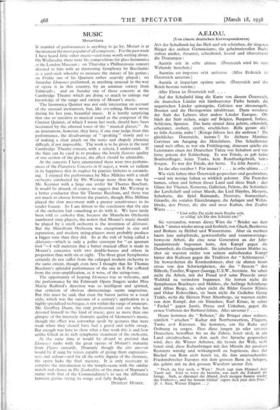MUSIC
Mozartiana
IF number of performances is anything to go by, Mozart is at the moment the most popular of all composers. For the past week I have heard little other music—and none worth writing about. On Wednesday there were his compositions for glass harmonica at the London Museum ; on Thursday a Philharmonic concert devoted to him with an interesting Symphony by Boccherini as a yard-stick whereby to measure the stature of his genius ; on Friday one of his Quartets rather scurvily played ; on Saturday Idomeneo performed, as anything unusual in the way of opera is in this country, by an amateur society from Falmouth ; and on Sunday one of those concerts at the Cambridge Theatre which are doing so much to enlarge our knowledge of the range and variety of Mozart's music.
The harmonica Quintet was not only interesting on account of the unusual instrument, but, like everything Mozart wrote during his last year, beautiful music. It is hardly surprising that one so sensitive to musical sound as the composer of the Clarinet Quintet, of which I wrote last week, should have been fascinated by the ethereal tones of the " musical glasses." As an instrument, however, they have, if one may judge from this performance, the disadvantage of " speaking " slowly and so of making a clear attack on the notes and shapely phrasing difficult, if not impossible. The work is to be given at the next Cambridge Theatre concert, with a celesta, I understand. If the flute can be cued in to produce the lovely flautato quality of one section of the glasses, the effect should be admirable. , At the concerts I have enumerated there were two perform- ances of the Pianoforte Concerto in G major, a work so radiant in its happiness that its neglect by pianists hitherto is astonish- ing. I enjoyed the performance by Miss Milkina with a small orchestra conducted by Mr. Westrup more than the one by Mr. Kentner with a large one under Sir Thomas Beecham. It would be absurd, of course, to suggest that Mr. Westrup is a better conductor than Sir Thomas Beecham, and there was not much to choose between the pianists, though Miss Milkina played the slow movement with a greater sensitiveness to its tender beauty. So I am driven to the conclusion that the size of the orchestra had something to do with it. We have lately been told ex cathedra that, because the Mannheim Orchestra numbered sixty players, the notion that Mozart's music should be played by a small Orchestra is the invention of dilettanti. But the Mannheim Orchestra was exceptional in size and reputation, and modern string-players most probably produce a bigger tone than they did. So at the risk of being called a dilettante—which is only a polite synonym for " an ignorant fool "—I will maintain that a better musical effect is made in Mozart's concertos with two double-basses and others in proportion than with six or eight. The three great Symphonies certainly do not suffer from the enlarged modern orchestra to the same extent, though even here I thought that Sir Thomas Beecham's splendid performance of the one in E flat suffered from the over-amplification, as it were, of the string-tone.
The opportunity of hearing Idomeneo was so welcome, and the performance by the Falmouth Opera Singers under Miss Maisie Radford's direction was so intelligent and spirited, that criticism of obvious shortcomings seems ungracious. But this must be said, that even the barest justice to a vocal style, which was the outcome of a century's application to a highly specialised technique, is not within the range of amateurs. Mr. Geoffrey Dunn, the only professional and one who has devoted himself to this kind of music, gave us more than one glimpse of the intensely dramatic quality of Idomeneo's music, though the effect was somewhat spoilt by gestures that were weak when they should have had a grand and noble sweep. But enough was here to show what a fine work this is and how unlike Gluck in its rich symphonic treatment of the orchestra.
At the same time it would be absurd to pretend that Idomenco ranks with the great operas of Mozart's maturity from Figaro onwards. Dramatic though the airs are—or would be if sung by voices capable of giving them expressive- ness and colour—and for all the noble dignity of the choruses, the opera lacks the final mastery. It is only necessary to compare the introduction to the temple-scene with the similar march and chorus in Die Zauberflote or the music of Neptune's statue with that of the Commendatore's to see the difference between genius trying its wings and fully fledged.
DYNELEY HUSSEY.














































 Previous page
Previous page